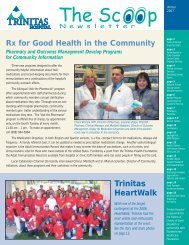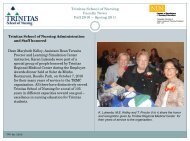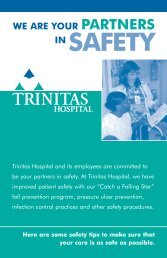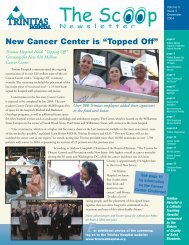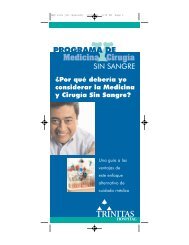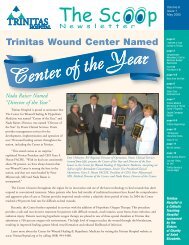Exclusive Interview⦠- Trinitas Hospital
Exclusive Interview⦠- Trinitas Hospital
Exclusive Interview⦠- Trinitas Hospital
- No tags were found...
You also want an ePaper? Increase the reach of your titles
YUMPU automatically turns print PDFs into web optimized ePapers that Google loves.
CANCER CENTER PARTICIPATES IN NEW CLINICAL TRIALSA multi-center nationwide clinical trialfor previously untreated patients with multiplemyeloma is currently offering hopefor improved treatments in the future. Aspart of the Aptium Oncology ResearchNetwork, <strong>Trinitas</strong> Comprehensive CancerCenter is working in partnership withseveral US cancer centers and principalinvestigators. Gerardo Capo, MD, specialistin Medical oncology and hematology,is serving as the principle investigator.Participation in the 05-MM-01 study iscurrently available in 10 medical facilitiesin the United States accepting volunteersfor this Phase II study.Multiple myeloma is a disease ofmalignant plasma cells. It affects about 5in 100,000 Americans at a median age of65 years and is still incurable. Multiplemyeloma is the second most prevalentblood cancer and is approximately twice asprevalent in men as in women. It is alsoamong the ten leading causes of death inAfrican Americans. In the United States,more than 14,000 new cases of multiplemyeloma are diagnosed every year and over11,000 people die of the disease.Over the past three decades, the treatmentfor multiple myeloma has beenmainly palliative, to provide comfort, witha median life expectancy of three years andTel: 732-602-8939Fax: 732-602-8940less than 10% living 10 years orlonger. “Nearly all patients experiencea relapse after their initial treatment,and unfortunately, there is stillno cure,” said Dr. Capo. “The besttherapies we have still only provide acontrolled remission in the most successfulinstances. There is clearly anurgent need for more therapies. Thisclinical trial may offer an option formultiple myeloma.”In another clinical trial participation,<strong>Trinitas</strong> Comprehensive CancerCenter is among about 400 researchsites nationwide that are partneringin a study to determine the prevalenceof stem cell mutation inGerardo Capo, MDpatients with bone marrow failuresyndromes. Dr. Gerardo Capo isagain serving as the principal investigator in men and women, the average age forlocally in this multi-center study.the diagnosis of PNH is 35 years. TheThe primary objective of thepercentage of patients with AA, MDS, andEXPLORE clinical study is to determine other bone marrow failure syndromes whothe percentage of patients with Aplastic have PNH is unclear. However, the determinationof this number through the clini-Anemia (AA), Myelodysplastic Syndromes(MDS), and other bone marrow failurecal study could represent an opportunitysyndromes, who also have PNH cells into detect, diagnose, and potentially treattheir blood. Paroxysmal NocturnalHemoglobinuria (PNH) is an uncommon patients with unrecognized PNH diseaseand potentially fatal blood disease that within these populations.occurs at almost any age. Found equally Paroxysmal Nocturnal Hemoglobinuria(PNH) is currently estimated to affect• Radiology• Dialysis• <strong>Hospital</strong>Admissions &Discharges• DoctorAppointments888-272-0002approximately 8,000 to 10,000 people inNorth America and Western Europe.PNH is a blood disorder that is caused bya mutation in the blood stem cells.Although PNH was named after the darkurine many patients experience, only 26percent of patients have this symptom atthe time of diagnosis. The only curativetreatment option for PNH is a bone marrowtransplant.FALL 2007 31





